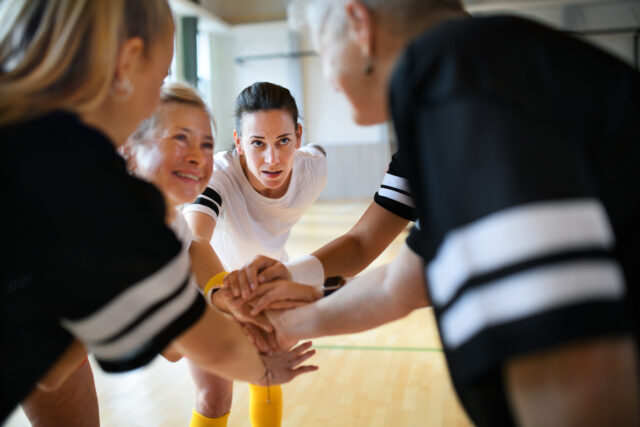Athletic directors have a profound responsibility that extends beyond developing skilled athletes. They play a crucial role in shaping well-rounded individuals prepared for life’s challenges. Successful athletic programs focus on both on-court performance and off-court development, creating a balanced environment that nurtures athletes holistically.
On-Court Development
Strengths-Based Coaching
- Adopt a strengths lens when coaching. This involves recognizing and building upon each player’s unique strengths while addressing their weaknesses. For example, a player who eagerly wants to participate in every play can be seen as highly motivated and competitive. Conversely, a supportive teammate who may not push to get back in the game displays strong team spirit and reliability.
- Athletic directors should encourage coaches to help athletes understand their strengths and how to leverage them during critical moments. Encouraging athletes to reflect on their contributions during practice and games helps reinforce this mindset.
Motivational Interviewing
- Implement motivational interviewing techniques to connect with athletes on a deeper level. This approach emphasizes active listening and understanding athletes’ motivations and challenges.
- Create an environment where athletes feel heard and supported, fostering their intrinsic motivation to improve and succeed.
Collaborative Goal Setting
- Engage athletes in setting individual and team goals. This collaborative approach ensures that goals are aligned with the athletes’ ambitions and the team’s objectives.
- Regularly review and adjust goals based on progress and feedback, making athletes feel invested in their development journey.
Off-Court Development:
Personal Growth Programs
- Integrate personal growth programs into the athletic curriculum. Providing weekly discussions and assignments focused on self-improvement, dependability, and resilience, can significantly improve athletes’ mindset and mentality.
- Encourage athletes to self-assess their performance in various aspects of life, such as academics, interpersonal relationships, and personal goals.
Character Building
- Emphasize core values such as Kaizen (continuous improvement), dependability, and toughness. These values should be reflected in daily activities and reinforced through consistent messaging
- Develop activities and discussions that highlight the importance of these traits, helping athletes understand their relevance beyond sports.
Life Skills Education
- Offer workshops and seminars on essential life skills, including time management, financial literacy, and effective communication. These skills are crucial for athletes’ success both during and after their sports careers.
- Invite guest speakers from various fields to share their experiences and provide practical advice.
The Coach-Athlete Relationship
Building Trust
- Foster strong, trusting relationships between coaches and athletes. A supportive coach-athlete relationship can inspire and uplift athletes, enhancing their performance and well-being.
- Coaches should be approachable, empathetic, and consistent in their support, balancing the roles of mentor, disciplinarian, and cheerleader.
Positive Reinforcement
- Use positive reinforcement to encourage desired behaviors and improvements.
- Recognize and celebrate athletes’ achievements, both big and small, to boost their confidence and motivation.
- Provide constructive feedback that focuses on growth and development rather than just criticism.
Empowering Athletes
- Empower athletes by involving them in decision-making processes and giving them ownership of their development. This approach fosters a sense of autonomy and accountability.
- Encourage athletes to take leadership roles within the team, promoting peer learning and support.
Athletic directors must prioritize the holistic development of their athletes, focusing on both on-court performance and off-court growth. By adopting strengths-based coaching, fostering strong coach-athlete relationships, and integrating personal growth programs, athletic programs can create an environment that nurtures well-rounded individuals prepared for success in sports and life. Embracing this comprehensive approach ensures that athletes not only excel in their athletic pursuits but also develop the character and skills needed to thrive beyond the court.




